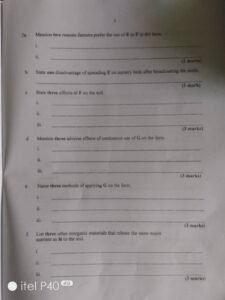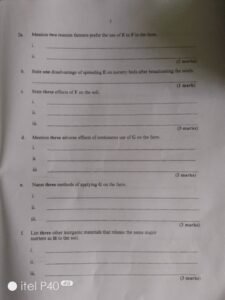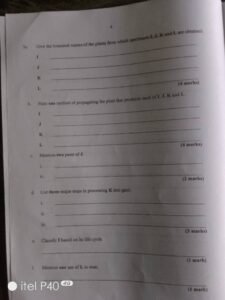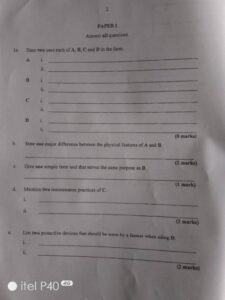Welcome to NECO verifies agricultural practical answers page. See the newly released NECO Agric Practical Questions June/July Answers specially prepared for your success. The exam is scheduled for 25th June, 2024. The National Examinations Council is an examination body in Nigeria that conducts the Senior Secondary Certificate Examination and the General Certificate in Education in June/July and November/December respectively.
The National Examinations Council wish to announce to all agric students that the practical questions and answers are now available online.
If you are a student taking this subject, all you need to do right now is to relax as we reveal the NECO June/July agricultural science practical answers to you.
We at edureport.ng are aware that a lot of website collect money from students to provide the Agric solution to them. Our website is different as we provide answers to all subject for free.
In this article, you will see all the necessary information concerning the Agric practical expo questions, including their answers and the required specimens for the examination.
[year] NECO Agric Practical Questions Verified Answers
We understand that you are here to find out if the NECO agric science practical question papers is out. Well, we would like to let you know that the question papers are out. It is currently with us, and we are verifying the authenticity of it. Once this process is completed, we will go ahead and solve it and upload it here for free.
Agricultural science question papers will be uploaded here for free. Keep refreshing this page to see it.





Question Papers Loading…97% completed
NECO Agric Practical Answers
Free Agric practical NECO expo answers loading…Keep refreshing this page
Solving/Typing……
Answers loading….
(1a)
=Specimen A(Hand Fork):
(i) Loosening soil in gardens and flower beds
(ii) Aerating soil around established plants
=Specimen B (Garden Fork):
(i) Turning over soil in preparation for planting
(ii) Breaking up clods and compacted soil
=Specimen C (Hand Trowel):
(i) Scooping and moving small amounts of soil or fertilizer
(ii) Planting seedlings and bulbs
=Specimen D (Knapsack Sprayer):
(i) Applying pesticides and herbicides to crops
(ii) Spraying fertilizers and water on plants
(1b)
Specimen A(Hand Fork) has shorter tines and a smaller head, making it suitable for lighter work in smaller areas, while Specimen B (Garden Fork) has longer tines and a larger head, making it better suited for heavier work in larger areas.
(1c)
Spade
(1d)
(i) Cleaning the trowel after each use to prevent rust and bacterial growth
(ii) Storing the trowel in a dry place to prevent damage to the handle and metal
(1e)
(i) Gloves
(ii) Goggles
(4a)
(i) Host of N. Tapeworm: Pig
(ii) Host of O. Roundworm: Chicken
(iii) Host of P. Tick: Cattle
(4b)
(i)Spec N; Proper disposal of animal waste
(ii)Spec O; Regular cleaning and disinfection of living quarters
(iii)Spec N; Avoiding undercooked meat and raw animal products
(4c)
(i)Refrigeration
(ii)Freezing
(iii)Smoking
(4d)
(i)Body shape: Tapeworms are long and flat, while Roundworms are cylindrical and rounded.
(ii)Body covering: Tapeworms have a tough, outer covering called a cuticle, while Roundworms have a smooth, outer layer.
(4e)
(i)Tick fever (Babesiosis)
(ii)Redwater disease (Babesia spp.)
==========================================
(3a)
=Specimen I (Onion Bulb): Allium cepa
=Specimen J (Yam Tuber): Dioscorea spp. ( various species)
=Specimen K (Cassava Tuber): Manihot esculenta
=Specimen L (Ginger): Zingiber officinale
(3b)
=Specimen I (Onion bulb); Bulb division
= Specimen J (Yam Tuber): Stem cuttings or setts
= Specimen K (Cassava Tuber): Stem cuttings
= Specimen L (Ginger): Rhizome cuttings
(3c)
(i) Yam beetles
(ii) Yam nematodes
(3d)
(i) Peeling and grating the tubers
(ii) Fermenting the grated cassava for 2-3 days
(iii) Frying the fermented cassava to produce garri
(3e)
Onion (Specimen I): Biennial plant (completes its life cycle in two years)
(3f)
It is used to treat various ailments such as nausea and digestive issues.
QUESTION 2
Solving/Typing……
Answers loading….
=========================================
![[year] NECO Agric Practical Questions June/July Answers](https://edureport.ng/wp-content/uploads/2024/06/neco.jpg)